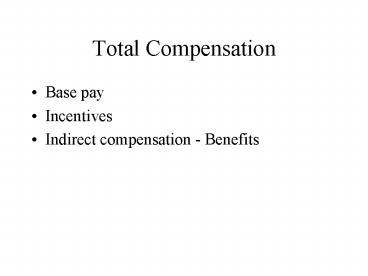Total Compensation PowerPoint PPT Presentation
1 / 21
Title: Total Compensation
1
Total Compensation
- Base pay
- Incentives
- Indirect compensation - Benefits
2
Developing a Compensation Plan
- Internal vs. External Equity
- Fixed vs. Variable Pay
- Performance vs. Membership
- Job vs. Individual Pay
- Egalitarianism vs. Elitism
- Below Market vs. Above Market
- Monetary vs. Non-Monetary Rewards
3
Developing a Compensation Plan, contd
- Open vs. Secret Pay
- Centralization vs. Decentralization of Pay
Decisions
4
Equity Issues
- Internal Equity
- Distributive Justice Model - the first step in
Equity Theory - External Equity
- Labour Market Model - law of supply and demand //
market based pay
5
Fixed vs Variable Pay
- Variable Risk/Return sharing
- Does fixed pay reduce risk for both employer and
employee?
6
Job Based Pay
- Stable technology
- standard jobs
- little crosstraining needed
- much training for each job
- low turnover
- expect employees to move up
7
Individual Based Pay
- Willing and able workforce
- changing technology and org structure
- teamwork encouraged
- limited upward mobility
- opportunity to learn new skills
- high cost of employee t/o and absenteeism
8
Job based pay
- EQUITY
9
Job Evaluation - Internal Equity
- Conduct job analysis
- write job descriptions
- determine job specifications
- rate worth of all jobs using a predetermined
system (compensable factors) - create a job hierarchy
- classify jobs by grade levels
10
Job Evaluation Systems
- Point Factor
- Ranking System
- Level Description or Classification System
- Factor Comparison
- Market Pricing Method
11
External Equity - Market Surveys
- Identify benchmark or key jobs
- establish a pay policy
12
Skill-based Compensation Plans
- Depth skills - expert in field
- Horizontal/Breadth skills - cross-training
- Vertical Skills - self-management competence
- consider job enlargement, rotation and enrichment
issues
13
Wage and Salary Curve
- The result of the plotting of points of
established pay grades against wage or salary
base rates to identify the general pattern of
wages or salaries and identify outliers.
14
Job Outliers - what do you do?
- Red circling
- Green circling
- market factor
15
Pay for Performance
- Individual employees and work teams differ in how
much they contribute to the firm - firms overall performance depends on the
performance of the individual employees - to attract retain and motivate high performers,
need to reward them based on relative performance.
16
Successful Pay for Performance
- Link pay and performance appropriately
- only a part of the whole HR strategy
- build employee trust
- believe that performance makes a difference
- multiple layers of rewards
- increase employee involvement
- motivate using non financial incentives
17
Types of Pay for Performance
- Individual based plans merit pay, bonuses,
awards - Team based plans
- Plant-wide plans - gain sharing
- Corporate-wide plans - profit sharing, ESOP
18
When is an Individual plan most appropriate?
- When you can isolate contribution of individual
employees - when job demands autonomy
- when co-operation is less critical to successful
performance or when competition is to be
encouraged
19
When will team-based plans succeed?
- Difficult to distinguish individual tasks
- when the firm reorganizes to take a team approach
to work - when objective is to foster entrepreneurship in
self-managed work groups
20
How to design sales compensation?
- How long should the time horizon be for
dispensing rewards? - Should length of service be considered?
- Should the salesperson be asked to share part of
the costs and increase personal risk? - What criteria should be used to trigger the award?
21
How to design sales compensation? (contd)
- Should there be a limit on what they can earn?
- How often should awards be provided?

